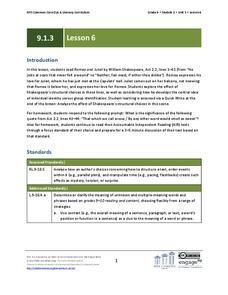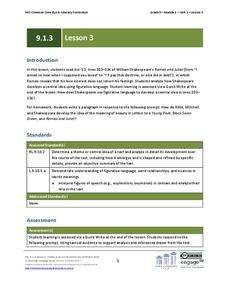Curated OER
Romeo And Juliet: Act V Reading And Study Guide
In this reading and study guide worksheet, students define 4 vocabulary words, define 2 literary terms, and respond to 15 short answer questions pertaining to Act V of "Romeo and Juliet" by William Shakespeare.
K20 LEARN
That Which We Call a Rose: Connotation and Denotation in Romeo and Juliet
Words carry weight. And some words carry baggage. Scholars learn the difference in a study of connotation and denotation. Individuals sort the cards into three groupings using words from Shakespeare's play. After sharing within groups,...
Curated OER
Romeo And Juliet: Act III Reading And Study Guide
In this reading and study guide worksheet, students define 7 vocabulary words, define 4 literary terms, and respond to 32 short answer questions pertaining to Act III of "Romeo and Juliet" by William Shakespeare.
Curated OER
Romeo and Juliet Newspapaer
Students create a newspaper based on their reading of Romeo and Juliet.
Curated OER
Romeo And Juliet: Act IV Reading And Study Guide
In this reading and study guide worksheet, students define 5 vocabulary words, define 2 literary terms, and respond to 15 short answer questions pertaining to Act IV of "Romeo and Juliet" by William Shakespeare.
Curated OER
Literary Response and Analysis: Romeo and Juliet's
Tenth graders complete characterization analysis for Shakespeare's Romeo and Juliet. In this characterization lesson, 10th graders work in learning tiers to analyze the characters and plot in the play. Students work under, at,...
Curated OER
Romeo and Juliet
Students read Romeo and Juliet and then write an essay from the point of either Lord Capulet or Friar Lawrence persuading someone to adopt their views concerning marriage.
EngageNY
Grade 9 ELA Module 1: Unit 3, Lesson 5
Class members continue their study of Romeo and Juliet by watching scenes from Baz Luhrmann’s Romeo + Juliet and then examining the figurative language Shakespeare uses in Act 1, scene 5, lines 92–109 when Romeo and Juliet meet at the ball.
Curated OER
Scene Writing: Literacy and Playwriting
Drama is ever-present in our daily lives and eloquently depicted on stage. Middle schoolers practice writing scenes based on different prompts and frameworks, and then perform those creative scenes for their classmates. The...
EngageNY
Grade 9 ELA Module 1: Unit 3, Lesson 6
The balcony scene from Romeo and Juliet takes center stage as class members consider the structural choices Shakespeare makes, i.e., having Romeo appear first in the scene and having Juliet appear unaware that Romeo is listening to her...
Education Closet
West Side Shifts
Combine math, language arts, music, and dance with an activity focused on "America" from West Side Story. After listening to the song, learners compare the film to Romeo and Juliet, analyze the song's meter, design choreography, plan...
EngageNY
Grade 9 ELA Module 1: Unit 3, Lesson 13
Readers examine the conversation between Friar Laurence and Romeo in Act 3, scene 3 of Romeo and Juliet and consider how Shakespeare's word choices impact the development of Romeo's character.
EngageNY
Grade 9 ELA Module 1: Unit 3, Lesson 18
Why is Romeo and Juliet considered a tragedy? Class members conclude their reading of the play, focusing on the final lines of Act 5, scene 3. They also consider how Shakespeare structures the text, orders events, and manipulates time to...
EngageNY
Grade 9 ELA Module 1: Unit 3, Lesson 9
After viewing Baz Luhrmann’s depiction of Romeo and Juliet's marriage, the class listens to a recording of Act 3, Scene 1, lines 59–110. Then, groups consider how Shakespeare develops Romeo’s character through his interactions with...
EngageNY
Grade 9 ELA Module 1: Unit 3, Lesson 11
The study of Romeo and Juliet continues as pairs use the provided summary tool worksheet to record evidence of how Shakespeare uses dramatic irony to heighten the tension in Juliet's soliloquy in Act 3, scene 2, lines 1–31.
EngageNY
Grade 9 ELA Module 1: Unit 3, Lesson 3
Class members listen to a masterful reading of Act 1, Scene 1, lines 203-236 of Romeo and Juliet and then break into groups to examine how Shakespeare uses figurative language to develop Romeo's idealized concept of beauty.
EngageNY
Grade 9 ELA Module 1: Unit 3, Lesson 17
Romeo and Juliet, Act 5, Scene 3, lines 139-170, is the focus of this day's lesson plan. Readers examine the dramatic irony in Juliet's comments and consider how "lamentable chance" caused by a "greater power" plays a role in the tragedy.
EngageNY
Grade 9 ELA Module 1: Unit 3, Lesson 7
How does Shakespeare use dialogue to develop the idea that the star-crossed lovers are more concerned with their relationship as individuals than they are with their roles as children of warring families? That is the question facing...
EngageNY
Grade 9 ELA Module 1: Unit 3, Lesson 8
As a mid-unit assessment, class members craft an in-class essay response to the prompt: "How does Shakespeare’s development of the characters of Romeo and Juliet refine a central idea in the play?"
EngageNY
Grade 9 ELA Module 1: Unit 3, Lesson 15
Where does Friar Laurence's loyalty lie? After listening to a reading of Act 4, scene 1, lines 89-126 of Romeo and Juliet, groups examine the details of Friar Laurence's plan.
EngageNY
Grade 9 ELA Module 1: Unit 3, Lesson 19
To prepare for the unit's final assessment essay, class members collaborate to find evidence that reveals Romeo and Juliet as tragic heroes.
EngageNY
Grade 9 ELA Module 1: Unit 3, Lesson 20
The final session in this 20-lesson plan unit asks individuals to use their Quick Writes, discussion notes, worksheets, and annotated text to craft and support a claim about how Shakespeare develops either Romeo or Juliet as tragic heroes.
Curated OER
It's All in the Way You Say It
High schoolers unearth multiple meanings based on connotation and cadence. After defining denotation, connotation, and cadence, readers evaluate similar words to compare connotations. They then play with how cadence affects meaning by...
Curated OER
Language Arts Jeopardy
Be the next Alex Trebek in this language arts themed Jeopardy game! Categories include Lit Terms, Short Stories, Romeo and Juliet, Tom Sawyer, and The Miracle Worker. By clicking on each category (points from 1-5), a slide with the...

























